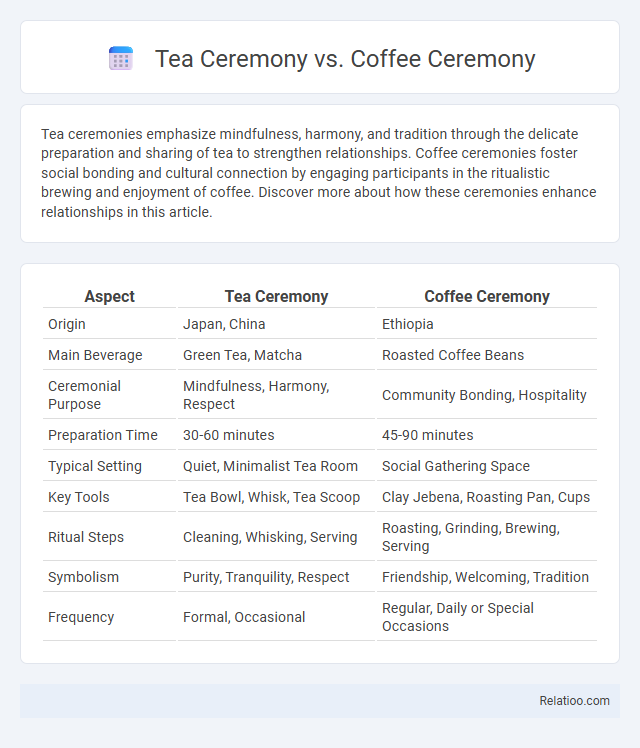Tea ceremonies emphasize mindfulness, harmony, and tradition through the delicate preparation and sharing of tea to strengthen relationships. Coffee ceremonies foster social bonding and cultural connection by engaging participants in the ritualistic brewing and enjoyment of coffee. Discover more about how these ceremonies enhance relationships in this article.
Table of Comparison
| Aspect | Tea Ceremony | Coffee Ceremony |
|---|---|---|
| Origin | Japan, China | Ethiopia |
| Main Beverage | Green Tea, Matcha | Roasted Coffee Beans |
| Ceremonial Purpose | Mindfulness, Harmony, Respect | Community Bonding, Hospitality |
| Preparation Time | 30-60 minutes | 45-90 minutes |
| Typical Setting | Quiet, Minimalist Tea Room | Social Gathering Space |
| Key Tools | Tea Bowl, Whisk, Tea Scoop | Clay Jebena, Roasting Pan, Cups |
| Ritual Steps | Cleaning, Whisking, Serving | Roasting, Grinding, Brewing, Serving |
| Symbolism | Purity, Tranquility, Respect | Friendship, Welcoming, Tradition |
| Frequency | Formal, Occasional | Regular, Daily or Special Occasions |
Historical Origins of Tea and Coffee Ceremonies
The historical origins of tea ceremonies date back to ancient China during the Tang Dynasty, emphasizing harmony, respect, and tranquility in the art of tea preparation and consumption. In contrast, coffee ceremonies originated in Ethiopia, where they evolved as a social ritual symbolizing hospitality and community bonding through the meticulous roasting and brewing of coffee beans. Hosting both ceremonies involves distinct cultural practices, with tea ceremonies reflecting contemplative appreciation and coffee ceremonies fostering communal connection and celebration.
Cultural Significance Across Regions
The Tea Ceremony holds profound cultural importance in East Asia, symbolizing harmony, respect, and tranquility, often associated with Zen Buddhism and traditional rituals in Japan and China. Coffee Ceremonies, such as the Ethiopian buna ceremony, emphasize community bonding, hospitality, and social connection, reflecting centuries-old customs rooted in African traditions. Hosting practices vary globally, with cultural significance reflecting regional values; for example, Middle Eastern hospitality prioritizes generosity and honor, while Western hosting often centers on social networking and entertainment.
Rituals and Traditional Procedures Compared
Tea ceremonies emphasize precise movements, harmonious gestures, and symbolic tools reflecting centuries-old East Asian cultural philosophies, such as Japanese chanoyu or Chinese gongfu tea ritual. Coffee ceremonies, particularly in Ethiopian tradition, revolve around elaborate roasting, brewing, and serving sequences that foster social bonds and community respect through shared sensory experiences. Hosting practices integrate these rituals by prioritizing hospitality etiquette, spatial arrangement, and timing to create meaningful interpersonal connections rooted in cultural heritage.
Tools and Utensils Used in Each Ceremony
Tea ceremonies utilize delicate porcelain teapots, matcha bowls, bamboo whisks, and silk cloths to achieve precise preparation and presentation, emphasizing harmony and mindfulness. Coffee ceremonies, especially traditional Ethiopian ones, require a jebena (clay coffee pot), small cups called cinchanas, and charcoal braziers to roast and brew fresh coffee in a communal setting. Hosting rituals involve various tools depending on the culture but commonly include serving trays, decorative bowls, and utensils designed to enhance social interaction and comfort, ensuring Your guests feel honored and welcomed.
Symbolism in Tea and Coffee Ceremonies
Tea and coffee ceremonies are rich in symbolism, each reflecting cultural values and social bonds; tea ceremonies emphasize harmony, respect, purity, and tranquility, symbolizing mindfulness and spiritual connection. Coffee ceremonies, especially in Ethiopian culture, represent hospitality, community, and generosity, highlighting the importance of social cohesion and shared experiences. Hosting either ceremony embodies a ritualistic invitation of trust and unity, where the preparation and presentation symbolize honor and mutual respect between host and guest.
Social Roles and Community Connection
Tea ceremonies foster deep social bonds through ritualized sharing, emphasizing mindfulness and respect within community gatherings. Coffee ceremonies, particularly in Ethiopian culture, serve as extended social events that strengthen communal ties and encourage storytelling, creating a space for dialogue and unity. Hosting either ceremony highlights your role as a cultural connector, facilitating meaningful interactions that nurture trust and belonging among participants.
Aesthetic Values and Presentation
The Tea Ceremony emphasizes simplicity and mindfulness, highlighting delicate utensils and precise movements that create a tranquil, harmonious atmosphere. In contrast, the Coffee Ceremony often showcases cultural richness through ornate serving trays, intricate pouring techniques, and communal participation, enhancing the sensory experience. Your choice of hosting style can elevate gatherings by focusing on either the refined elegance of tea, the vibrant ritual of coffee, or a personalized blend of aesthetic presentation and social connection.
Influences on Modern Lifestyles
Tea ceremonies, rooted in East Asian traditions, emphasize mindfulness and simplicity, influencing modern lifestyles by encouraging intentional rituals and stress reduction. Coffee ceremonies, prominent in Ethiopian culture, foster social bonding and community engagement, impacting contemporary habits by prioritizing connection and shared experiences in daily routines. Your approach to hosting increasingly integrates these ceremonies' values, blending mindfulness and social interaction to create meaningful gatherings in modern life.
Tea Ceremony vs Coffee Ceremony: Health and Wellness Aspects
The Tea Ceremony promotes health through antioxidants like catechins and L-theanine, which support relaxation and cognitive function, while the Coffee Ceremony offers benefits such as increased alertness and improved metabolism due to caffeine content. Both ceremonies emphasize mindful preparation and sensory engagement, enhancing mental well-being and social connection. Regular practice of either can contribute to stress reduction and overall wellness by fostering ritualistic mindfulness and community bonding.
The Evolving Future of Beverage Ceremonies
Tea, coffee, and hosting ceremonies are evolving to blend tradition with modern hospitality trends, emphasizing mindfulness, sustainability, and cultural appreciation. Your experience in these rituals now integrates innovative brewing techniques, eco-friendly practices, and personalized guest interactions, reflecting a shift towards holistic and immersive beverage ceremonies. This transformation positions tea and coffee ceremonies as dynamic platforms for social connection and sensory exploration in contemporary settings.

Infographic: Tea Ceremony vs Coffee Ceremony
 relatioo.com
relatioo.com